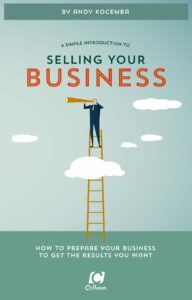Some surprises are good, and some are not. Finding that some of the proceeds from the sale your business have disappeared . . . that’s the bad kind of surprise.
While there’s many places where the purchase price gets nibbled at, there’s a few areas that can take a big bite out.
Andy Kocemba’s straight-forward book A Simple Introduction to Selling Your Business talks about three areas most likely to take the biggest bite of your apple.

Chapter 9: What Will You Walk Away With?
What your business sells for does not equal the amount of money you put in your pocket. As part of our work with businesses owners as they prepare to sell their businesses, we provide business valuations. Knowing the market value of your business (what you can expect the business to sell for on the open market) is a key piece of information that you will need in order to make educated decisions regarding whether to sell, what price to accept, and so on.
On a few unfortunate occasions, I have seen sellers surprised at closing by financial obligations they had overlooked, which ate into their net proceeds. Suddenly, a seven-figure sale price can net only a few hundred thousand to their personal account. Not an ideal scenario. How can that happen? How can you avoid the same fate?
There are three main items to remember as you evaluate a sale price for your business and what it would put in your wallet.

You Will Pay Your Debts:
Most small businesses are sold as asset sales. Simply put, the assets of one corporation are sold, free and clear, to another corporation. The emphasis here is on “free and clear,” meaning that at closing, before you get any money yourself, any loans and debt you have against the business will be paid in full. Any financed equipment and vehicles will be paid off. Any real estate loans will be satisfied. All balances will be brought current.
In the case of a stock sale, a business owner sells all the stock of their company, and is not responsible for the debt unless agreeing to be as part of the negotiations. Under this scenario however, you must remember that the seller also gives up any claim to receivables.

You Will Pay Your Taxes:
One of the two great certainties in life is taxes. Your tax liabilities can vary greatly depending on the allocation of the purchase price (which is agreed to between buyer and seller), your tax bracket, and your personal financial situation. It is of utmost importance that you involve your accounting and tax professional in your sale from the very beginning. They will be able to help you to negotiate an allocation that is favorable to you, and to help you properly anticipate what you will owe Uncle Sam after closing.
You Will Likely Finance a Portion of the Transaction: 
Almost all sellers begin the selling process by stating they will not finance the purchase. The reality is, they usually must if they want to sell their company. Even a bank financed transaction may require that the sellers keep some skin in the game. SBA loans typically have sellers carry 10 percent of the purchase price, while conventional financing requires more. If a bank is not involved, the seller should expect to finance an even higher percentage of the sale price. This differs from debts and taxes in that eventually you will receive your money, but you need to remember that it is a portion of the sale price you won’t be carrying away from the closing table.
Closing the sale of your business is a big day. You are hopefully rewarded for your life’s work, and can set yourself up for a comfortable retirement. Being aware of the factors that determine your net proceeds at closing can be a game changer. Be sure to involve your team of experts, and be prepared for what’s ahead.
Get a free copy of the book here:
